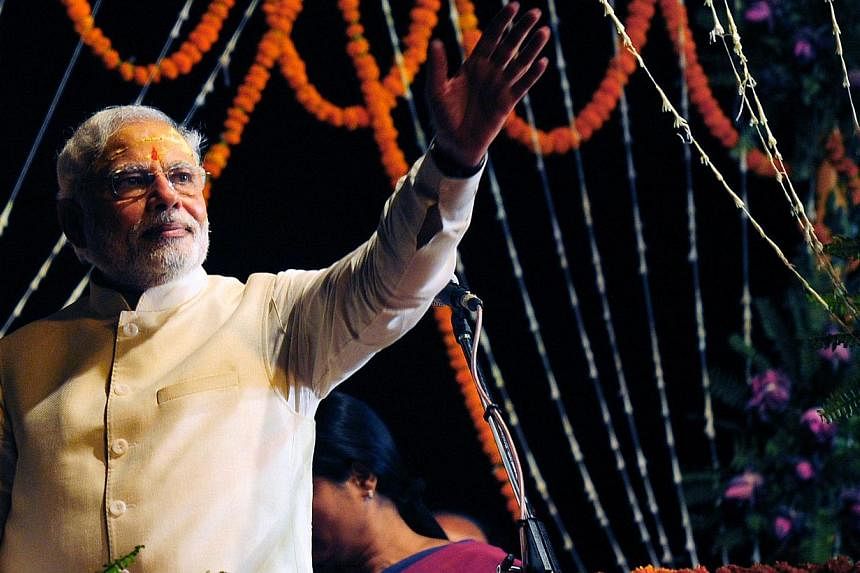WASHINGTON (AFP) - Narendra Modi's crushing victory in India's elections presents an awkward task for Western powers who shunned the Hindu nationalist leader for years but see New Delhi as a crucial partner.
US President Barack Obama and other Western leaders invited the incoming prime minister to visit in congratulatory telephone calls and stressed common interests with the world's largest democracy after Mr Modi's Bharatiya Janata Party (BJP) won India's widest victory in three decades.
The same governments until recently treated Mr Modi as a pariah due to accusations the Gujarat state leader turned a blind eye or worse to deadly anti-Muslim riots in 2002. The United States in 2005 refused him a visa on human rights grounds US officials "are painfully aware that they are at a real disadvantage by not having a relationship with Modi or really knowing him," said Milan Vaishnav of the Carnegie Endowment for International Peace.
"They are going to try to remedy that as quickly as possible." As signs grew that Mr Modi was cruising to victory, the United States has rushed to undo the bad blood.
The outgoing US ambassador to India, Nancy Powell, met with him in February, and the State Department has made clear he will have no visa problem as prime minister.
Other Western nations moved more swiftly to court Modi, with the British and French ambassadors visiting him well before the elections.
A confidential US diplomatic cable written during the 2005 visa row, released by the website WikiLeaks, warned that a BJP with Mr Modi in charge would be "more anti-American and less cooperative with the US," although it also predicted that Mr Modi would bring electoral disaster.
But the warming of the once-distant US-India relationship largely took place when the BJP was last in power during the 1998-2004 premiership of Atal Behari Vajpayee.
Mr Modi, who has little foreign policy experience, recently stated that international relations should be based on interests rather than individuals - a comment that, US diplomats hope, indicates he will not hold a grudge.
His top campaign promise has been on the economy, and he courted Western investors in Gujarat even while governments shunned him.
Mr Modi's sweeping majority would allow the government to push through business-friendly changes, although the BJP has criticized the outgoing government's key reform of opening India to foreign retailers such as Walmart.
Alyssa Ayres, a former State Department official focused on South Asia, said Modi appeared to be a "pragmatist" with his eyes on economic development.
But Ms Ayres, now a senior fellow at the Council on Foreign Relations, expected that the United States would still find quiet ways to pay attention to religious freedom.
"There is going to be, for some time, a lot of people focused on how he is going to govern - will it be Hindu-first or will he govern as someone who is a champion of India's great diversity and the magic that is everything about India?" she said.
With the West boycotting him, Mr Modi paid repeated visits to East Asia and became fixated on bringing India's development to the level of neighbouring giant China.
Diplomats predict Mr Modi may pay an early visit to Japan, where Prime Minister Shinzo Abe - a fellow nationalist who won his country's strongest political mandate in years through economic promises - could be a kindred spirit.
The United States would welcome India's engagement to its east, which comes as Mr Obama pursues a "pivot" strategy of shifting resources to Asia, where several nations are uneasy over China's rise.
"US and Indian interests tend to align," said Vikram Singh, an architect of the Pentagon's pivot, who is now a vice president at the Center for American Progress.
"At their base, I don't see Modi's interests for India being in any way radically different," he added. "They both want a stable, peaceful region and to deal with shared threats like terrorism," he said.
But US-India relations have not always been stable, with New Delhi angrily taking counter-measures after US authorities in December arrested a New York-based Indian diplomat for allegedly mistreating her servant.
And whatever the common interests, it remains to be seen if Mr Modi can forge a personal bond with foreign leaders. A first opportunity may be at the UN General Assembly in September in New York.
Mr Obama has voiced deep respect for outgoing prime minister Manmohan Singh, 81, a soft-spoken Oxford-educated economist.
Mr Modi is not known for his ease in English and has chosen a life of solitude, spending two years of his youth wandering the Himalayas.
"There is getting to have to be a getting-to-know-you period," mr Vaishnav said. "It is going to take time to build those links which we have kind of taken for granted."

